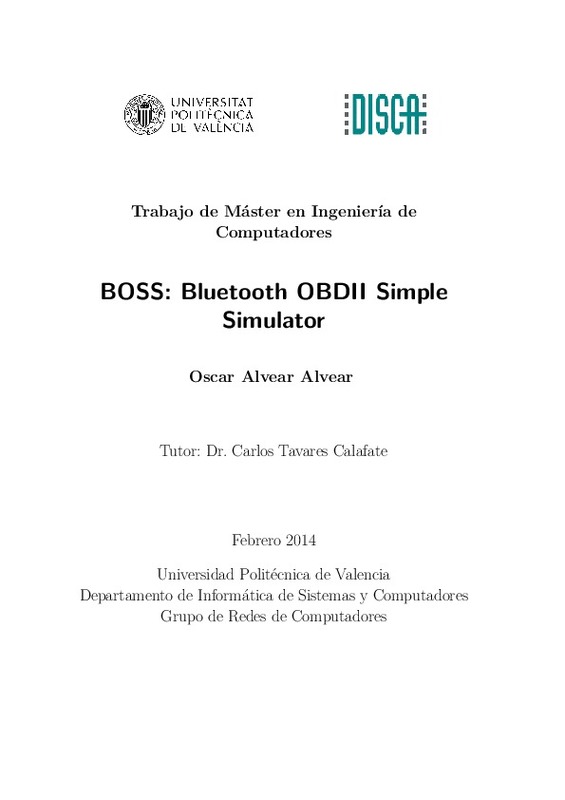JavaScript is disabled for your browser. Some features of this site may not work without it.
Buscar en RiuNet
Listar
Mi cuenta
Estadísticas
Ayuda RiuNet
Admin. UPV
Boss: bluetooth OBDII simple simulator
Mostrar el registro sencillo del ítem
Ficheros en el ítem
| dc.contributor.advisor | Tavares de Araujo Cesariny Calafate, Carlos Miguel
|
es_ES |
| dc.contributor.author | ALVEAR ALVEAR, ÓSCAR
|
es_ES |
| dc.date.accessioned | 2015-02-25T12:50:43Z | |
| dc.date.available | 2015-02-25T12:50:43Z | |
| dc.date.created | 2014-02-28 | |
| dc.date.issued | 2015-02-25 | |
| dc.identifier.uri | http://hdl.handle.net/10251/47470 | |
| dc.description.abstract | [EN] The majority of vehicles built during the last decade integrate an On Board Diagnostic (OBD II) interface, through which it is possible to monitor and manage multiple operational parameters. In the past few years, Bluetooth OBD II devices have been introduced in the market to facilitate connection to mobile devices. With the increased use of these devices, a lot of applications for control and monitoring of different parameters "in real time" is being developed; so, this infrastructure has opened a broad research area related to "smart driving". The main problem in the development of these applications is the need to have a vehicle, along with the Bluetooth OBD II connector, for debugging and validation purposes. Furthermore, the challenge of testing different configurations in different scenarios remains. Our proposal to address this problem is BOSS: Bluetooth OBDII Simple Simulator, which allows testing the correctness and the performance of applications on a regular computer. Another useful functionality of BOSS is the emulation of Geo-positions in Android Systems through a GPS-Emulator. By combining both functionalities, BOSS provides a complete development environment for mobile vehicular applications. | es_ES |
| dc.description.abstract | [ES] La mayoría de los vehículos fabricados en la última década integran una interfaz de diagnóstico llamada OBDII, mediante la cual es posible monitorizar y administrar múltiples parámetros operacionales. En los últimos años, dispositivos Bluetooth OBDII se han introducido en el mercado para facilitar la conexión a dispositivos móviles. Con el incremento del uso de estos dispositivos se están desarrollando muchas aplicaciones para control y monitorización en tiempo real de diferentes parámetros de los vehículos; esta infraestructura ha abierto una amplia área de investigación relacionada con la conducción inteligente. El mayor problema para desarrollar este tipo de aplicaciones es la necesidad de tener un vehículo, con un conector Bluetooth OBDII, para depurar y validar las aplicaciones. Además, incluso teniendo un vehículo, el problema de probar diferentes configuraciones en diferentes escenario prevalece. Nuestra propuesta para solventar este problema es BOSS: Bluetooth OBDII Simple Simulator, el cual permite probar la exactitud y el rendimiento de las aplicaciones en un computador regular. Otra funcionalidad de BOSS es la emulación de Geo-posicionamiento en Sistemas Android mediante GPS-Emulator. Combinando las dos funcionalidades, BOSS provee un completo ambiente de desarrollo para aplicaciones vehiculares móviles. | es_ES |
| dc.format.extent | 92 | es_ES |
| dc.language | Inglés | es_ES |
| dc.publisher | Universitat Politècnica de València | es_ES |
| dc.rights | Reconocimiento - No comercial - Sin obra derivada (by-nc-nd) | es_ES |
| dc.subject | Bluetooth | es_ES |
| dc.subject | OBDII | es_ES |
| dc.subject | Simulador | es_ES |
| dc.subject | Simulator | es_ES |
| dc.subject.classification | ARQUITECTURA Y TECNOLOGIA DE COMPUTADORES | es_ES |
| dc.subject.other | Máster Universitario en Ingeniería de Computadores-Màster Universitari en Enginyeria de Computadors | es_ES |
| dc.title | Boss: bluetooth OBDII simple simulator | es_ES |
| dc.type | Tesis de máster | es_ES |
| dc.rights.accessRights | Abierto | es_ES |
| dc.contributor.affiliation | Universitat Politècnica de València. Servicio de Alumnado - Servei d'Alumnat | es_ES |
| dc.description.bibliographicCitation | Alvear Alvear, Ó. (2014). Boss: bluetooth OBDII simple simulator. http://hdl.handle.net/10251/47470 | es_ES |
| dc.description.accrualMethod | Archivo delegado | es_ES |






